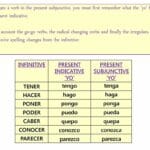This comprehensive guide equips you with the knowledge to confidently use the French verb “connaître,” allowing you to express familiarity with people, places, and experiences. Whether you’re a beginner or an experienced learner, this resource will enhance your French proficiency.
Understanding Connaître
Connaître signifies familiarity or acquaintance. Think “I know Paris,” “I know my neighbor,” or “I know that song.” It’s about having a connection with someone or something. Crucially, distinguish connaître from savoir, which implies knowledge of facts or skills. Connaître centers on acquaintance, not factual knowledge. For a deeper dive into similar verbs, check out our guide to conjugate the verb conocer.
Connaître Conjugation Breakdown
Connaître is irregular, deviating from typical verb patterns. While memorization is likely needed, consistent practice simplifies the process. Let’s explore various tenses and moods:
Present Tense (Présent)
The present tense, your most frequently used tense, conjugates as follows:
| Pronoun | Conjugation | Example |
|---|---|---|
| Je | connais | Je connais Marie. (I know Marie.) |
| Tu | connais | Tu connais ce restaurant ? (Do you know this restaurant?) |
| Il/Elle/On | connaît | Il connaît la réponse. (He knows the answer.) |
| Nous | connaissons | Nous connaissons bien Londres. (We know London well.) |
| Vous | connaissez | Vous connaissez cette chanson ? (Do you know this song?) |
| Ils/Elles | connaissent | Ils connaissent mes parents. (They know my parents.) |
Past Tense (Passé Composé)
To describe completed past actions, use the passé composé with the auxiliary verb avoir:
| Pronoun | Conjugation | Example |
|---|---|---|
| J’ | ai connu | J’ai connu Jean à l’université. (I knew Jean at university.) |
| Tu | as connu | Tu as connu mes grands-parents ? (Did you know my grandparents?) |
| Il/Elle/On | a connu | Elle a connu des jours meilleurs. (She has known better days.) |
| Nous | avons connu | Nous avons connu la faim pendant la guerre. (We knew hunger during the war.) |
| Vous | avez connu | Vous avez connu ce problème avant ? (Have you encountered this problem before?) |
| Ils/Elles | ont connu | Ils ont connu beaucoup de succès. (They have known a lot of success.) |
Imperfect Tense (Imparfait)
The imperfect tense denotes ongoing or habitual past actions:
| Pronoun | Conjugation | Example |
|---|---|---|
| Je | connaissais | Je connaissais bien cette ville quand j’étais enfant. (I knew this city well when I was a child.) |
| Tu | connaissais | Tu connaissais déjà cette histoire ? (Did you already know this story?) |
| Il/Elle/On | connaissait | Il connaissait tous les secrets. (He knew all the secrets.) |
| Nous | connaissions | Nous connaissions ce quartier comme notre poche. (We knew this neighborhood like the back of our hand.) |
| Vous | connaissiez | Vous connaissiez la vérité ? (Did you know the truth?) |
| Ils/Elles | connaissaient | Ils connaissaient le chemin par cœur. (They knew the way by heart.) |
Exploring Further Tenses and Moods
Beyond these foundational tenses, the future tense, subjunctive, conditional, and others await exploration as your skills progress.
Connaître vs. Savoir: Clarifying the Distinction
This frequently causes confusion, but the difference is essential:
- Connaître: To be familiar or acquainted with a person, place, or thing.
- Savoir: To know a fact, piece of information, or how to do something.
Examples:
- Connaître: Je connais Paul. (I know Paul – I am acquainted with him).
- Savoir: Je sais que Paul est médecin. (I know that Paul is a doctor – I possess this information).
- Connaître: Je connais cette musique. (I know this music – I am familiar with it).
- Savoir: Je sais jouer du piano. (I know how to play the piano – I have this skill). Current research suggests that this distinction might stem from the Latin origins of these words, though further investigation is ongoing.
Practice and Tips for Mastering Connaître
Learning conjugations requires practice. Try these strategies:
- Flashcards: Create flashcards with various connaître conjugations.
- Sentence Construction: Form sentences using connaître in different tenses.
- Conversational Practice: Practice using connaître with a language partner or tutor.
- Immersion: Surround yourself with French media to observe connaître in context.
Consistency and embracing mistakes are key to fluency.
Mastering the Passé Composé of Connaître
The passé composé is essential for expressing past experiences. For connaître, it uses the auxiliary verb “avoir” and the invariable past participle “connu.”
Conjugation Table
| Pronoun | Passé Composé of Connaître | Example |
|---|---|---|
| J’ | ai connu | J’ai connu Marie à Paris. (I met/knew Marie in Paris.) |
| Tu | as connu | Tu as connu mes amis? (Did you meet/know my friends?) |
| Il/Elle/On | a connu | Il a connu des moments difficiles. (He experienced difficult times.) |
| Nous | avons connu | Nous avons connu ce bonheur. (We experienced this happiness.) |
| Vous | avez connu | Vous avez connu la vérité? (Did you learn the truth?) |
| Ils/Elles | ont connu | Ils ont connu la gloire. (They experienced glory.) |
Key Considerations
- Invariable Past Participle: “Connu” never changes, regardless of the subject.
- Connaître vs. Savoir: Use connaître for familiarity, savoir for facts or skills. Some experts believe this nuance adds depth to French expression, but there is ongoing debate on its precise historical development.
- Negative Form: Ne…pas surrounds the auxiliary verb (e.g., Je n’ai pas connu cette personne).
- Interrogative Form: Invert the pronoun and auxiliary verb (e.g., Avez-vous connu ce problème?).
Practice and Application
Consistent practice solidifies understanding. Construct sentences, engage in conversations, and utilize resources like Larousse and Le Conjugueur. Don’t be afraid to explore nuanced usages with prepositions like de nom (by name) and par cœur (by heart). This continuous learning will undoubtedly improve your French fluency.
- Star Ring Trends: Etsy vs Amazon - March 28, 2025
- Boost Pollinator Habitats: Baby Blue Eyes Sustainable Farming Guide - March 28, 2025
- Protect Big Black Bears: Effective Conservation Strategies - March 28, 2025
















1 thought on “Connaître Conjugation: Your Complete Guide (with Examples & Exercises)”
Comments are closed.